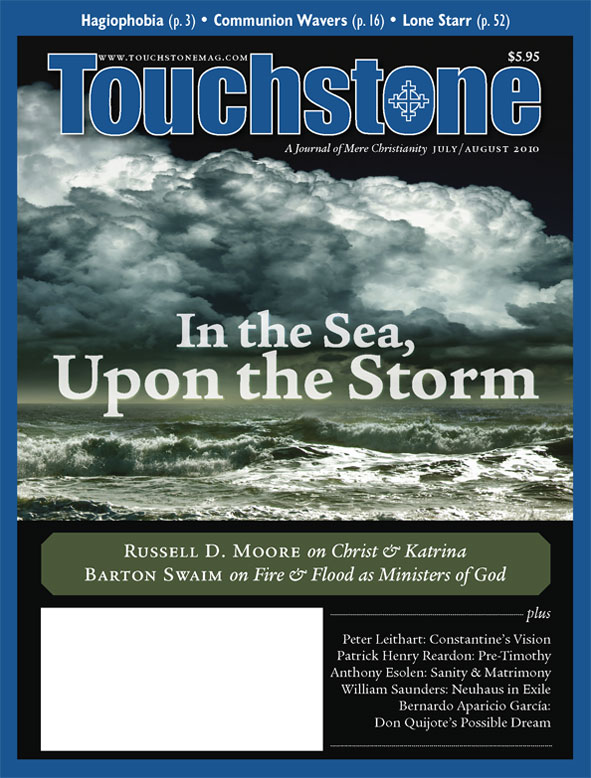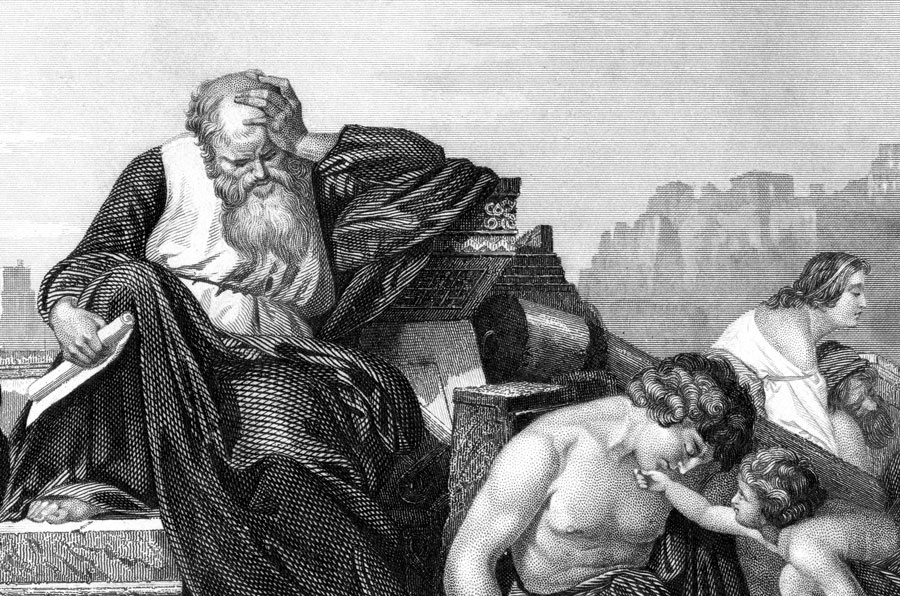View
Sacred Grammar
Patrick Henry Reardon on the Three Blessings of Timothy
In 2 Timothy 3:10–15 we have what appear to be among the last lines that St. Paul wrote on this earth. They were sent from Rome, probably during the two years of the apostle’s house arrest, as recorded in Acts, or perhaps somewhat later.
Paul, as he was preparing to die, reminded Timothy of the blessings of his youth. He wrote: “But you must continue in the things which you have heard and been assured of, knowing from whom you learned them, and that from childhood you have known the sacred Scriptures”—or “holy Scriptures” (that’s the way it’s translated in most translations; the Greek says hiera grammata, “the sacred grammar”)—“which are able to make you wise for salvation through faith which is in Christ Jesus.”
Paul reminded Timothy that, as a boy, he had learned his Bible stories from his mother, Eunice, and his grandmother Lois, both mentioned by name in the first chapter of that same epistle. Raised in a Jewish family—though with a pagan father—he grew up with the inherited faith of the Scriptures. We should note in particular that the Scriptures referred to here are the Old Testament. At this point, the New Testament Scriptures are just in the process of composition.
Raised on Bible Stories
The Scriptures Timothy learned as a boy were the same Scriptures we learned as children, and which we, in turn, taught our families.
My wife and I remember our children being very fond of Joshua fighting the battle of Jericho. They dramatized that story by falling down like the walls of Jericho; it was all great fun. Besides, there was a song to go with it—something about Joshua “fitting” the battle of Jericho. They learned that song very quickly.
I also recall my children being very fond of the story of Elijah going up on a fiery chariot; there was also a song to go with that story. When we came to the destruction of Sodom and Gomorrah, I explained that the Cities of the Plain were punished for not picking up their toys.
We raised our own children with these stories: the histories of Abraham and Isaac, the travels of Jacob and Joseph, the exploits of Joshua and Gideon, the tragedies of Jephthah and Sampson, the adventures of Daniel and his three musketeers, the perils of Jeremiah, the journeys of Jonah, and the romance of Boaz and Ruth. We were very fond of these stories. In fact, we had a little pair of finches bearing the names of Boaz and Ruth.
The first and most serious responsibility of those raising children is to teach them grammar. Grammar is a discipline chiefly conveyed through narrative; poetry as well, and maxim, but chiefly narrative, which tends more readily to grab the interest of young ones. Timothy’s mother and grandmother not only raised the boy in the faith, but also instructed him in the study of sacred grammar, the sacred Scriptures—the grammata, “those things written.” It was this early pursuit of sacred letters, conducted in the home, which grounded the soul of the boy Timothy and prepared him to become in due course an apostle of the Church.
Lifelong Study
I have mentioned childhood in this respect simply because Paul does, but the study of sacred grammar is something that is supposed to go on for the rest of one’s life. I am absolutely unable to understand the mentality that says that by the time someone is graduated from eighth grade or twelfth grade or college the study of sacred grammar stops and it’s no longer done. St. John Chrysostom, who preached every day on the sacred Scriptures, and exegeted them every day for his congregation, or St. Gregory of Palamas, who did exactly the same thing a thousand years later, would never have agreed with this.
The idea that somehow Christians are going to preserve the faith in this country with a high-school knowledge of the sacred Scriptures is ridiculous. So these comments are not just about children, but about all of us. My own parishioners are familiar with the policy of our parish: There is a graduation ceremony from Sunday school; it’s called the Christian burial rite.
The Blessing of Inheritance
I suggest there were three blessings that came to young Timothy through the study of sacred grammar.
First, the handing on of sacred letters pertains to the formation of personal identity by the transmission of an inherited culture. Timothy learned the identity conferred on him by the tradition of a faithful household.
There is no such thing as an individual culture. Nor is culture something you can purchase. You don’t get a culture by buying season opera tickets and going to the art gallery. Personal identity is not a private affair. It is first of all domestic. Grammar and tradition are not private. They are inherited. Thanks to the two older generations that instructed him, Timothy was enabled to read Holy Scripture through the eyes of sacred tradition, in which alone the Bible is understood.
I remember, when I was a boy, my father telling of his time as a student at Boston College. Much addicted to music, he went often to the opera. Dad described how he’d go to the opera and sit high up in the balcony, following the text with his libretto. He was the only one with a libretto. Dad recalled those Italians sitting around him in the balcony, munching bread and sausage and cheese. They needed no libretto. Grand opera was their culture! They were raised with it. They knew who they were, because Verdi and Puccini told them who they were.
We derive our identities through our culture. And for those raised outside the culture of the Church, the first thing they must do is to join the Church. All culture—including biblical culture—is traditional culture. It is what binds the civilization together from one generation to the next.
Timothy’s study of sacred grammar was a great socializing agent in the formation of his character. By it, he became one with his own history, his family’s history, where he assimilated the organizing influences of the biblical narrative.
Paul wrote to Timothy during a time when Gentiles were embracing—for their own—a Jewish cultural inheritance. They were stepping into a line of history and becoming children of Abraham. That was an enormous transition for Greeks and Romans. For them to become Christians was a very big deal. Could they actually do it? Could they actually enter into the stream of salvation? Much of the New Testament is devoted to that question.
The Blessing of Indoctrination
Second, through his pursuit of grammar and history, Timothy learned to take possession of his heart. The stories of the Bible, organized around its integrating themes, enabled Timothy to make sense of his heart. He learned who he was, his place in this world, what God expected of him, and what he could expect both during his life and at the end of it. Possession of the heart is the most important thing we can teach children in raising them in our Christian homes.
The stories of the Bible, assimilated in the context of the family, gave shape to Timothy’s moral imagination, conferring on his conscience a narrative moral sense. The biblical narrative gave moral organization to his mind. He was educated in the habits of the heart. He was, in the full, rich sense of the word, this precious participle, indoctrinated.
That passive participle has a bad press in contemporary society, a society with little sympathy for doctrine. Yet, to put doctrine inside of our children, to give shape to the mind and the heart is a precious thing. By indoctrination, sacred teaching is placed in the soul, giving formation to character.
Timothy did not learn the Bible just from the outside; he learned it from within. From inside himself, the biblical perspective on the world became his perspective. He became versed in the narratives, poetry, and maxims that enabled him to organize his heart, give structure to his soul and imagination, and rational formation to his conscience. His was a moral memory, a moral intellect, and a moral imagination. Timothy was the blessed recipient of a robust biblical culture. He did not grow up in moral and intellectual confusion.
At the very least, this fact saved a lot of time. Timothy was not obliged to spend years endeavoring to discover his identity. In fact, one suspects he would have found the notion rather silly.
The Blessing of History
Third, the transmission of identity is a living enterprise. History, after all, is the very opposite of same old same old. Same old same old is the culture of cats. I am thinking of a feline in our home—Tiglath-Pileser IV—with whom I have many conversations. Life, for Tig, is same old same old. He really has no history. I try to tell him of the great cats of yesteryear: those cats who established empires, composed poetry, constructed bridges. I try, in vain, to have Tig emulate the heroic cats of China and India.
Same old same old is the culture, not only of cats, but of the pine tree. The pine tree, like the cat, will make minor adaptations as it goes along, as needed for environmental adjustment. Beavers, likewise, pretty much construct their dams and lodges the way they did on the morning of the sixth day of creation. They’ve adapted a little bit here and there, as needed for survival, but as far as we can tell, beavers have always done things pretty much the same way. Animals and plants don’t have a history. Their existence is always same old same old.
History is not same old same old, because for us it’s a living, dynamic thing, which it is not for our cats and dogs. We might love them, and we do, but they don’t really have a history. They have no memory beyond their own. They don’t tell stories. They don’t erect monuments. They don’t inscribe gravestones, and precious few are their poems.
Timothy learned to take his place in the continuance of sacred history. This was a blessing of the Bible, for the Bible not only records the past, it also creates the present. It gives character—internal shape—to those who learn it. The Bible transforms history by designing the minds and changing the lives of those who come under the influence of its transforming power.
Discipled in the Kingdom
The Bible does not accomplish this simply as a work of literature; it accomplishes this as the word of God. The Scriptures are Spirit-breathed. When we read them, God is speaking to us here and now. In this respect, let us keep in mind that Timothy lived in a very critical period, the time of a mammoth historical transition, the years when the Church was split from the synagogue, and the original apostles were first disappearing from the earth. It was a traumatic, absolutely crucial time.
It was the tragedy of Timothy’s generation to witness the destruction of Jerusalem. It was also their privilege to form a living link between the apostles and the fathers of the Church. In all of biblical history, Timothy’s lifetime was the period of the greatest crisis.
But secure in the strong sense of his identity, Timothy boldly took his place in history. He stepped into the breach of time, a teacher personally informed by the inherited grammar of the past, and thus prepared to confer shape on the future. He was a scribe discipled in the kingdom, bringing forth new things and old.
Patrick Henry Reardon is pastor emeritus of All Saints Antiochian Orthodox Church in Chicago, Illinois, and the author of numerous books, including, most recently, Out of Step with God: Orthodox Christian Reflections on the Book of Numbers (Ancient Faith Publishing, 2019).
subscription options
Order
Print/Online Subscription

Get six issues (one year) of Touchstone PLUS full online access including pdf downloads for only $39.95. That's only $3.34 per month!
Order
Online Only
Subscription

Get a one-year full-access subscription to the Touchstone online archives for only $19.95. That's only $1.66 per month!
bulk subscriptions
Order Touchstone subscriptions in bulk and save $10 per sub! Each subscription includes 6 issues of Touchstone plus full online access to touchstonemag.com—including archives, videos, and pdf downloads of recent issues for only $29.95 each! Great for churches or study groups.
Transactions will be processed on a secure server.
more from the online archives
calling all readers
Please Donate
"There are magazines worth reading but few worth saving . . . Touchstone is just such a magazine."
—Alice von Hildebrand
"Here we do not concede one square millimeter of territory to falsehood, folly, contemporary sentimentality, or fashion. We speak the truth, and let God be our judge. . . . Touchstone is the one committedly Christian conservative journal."
—Anthony Esolen, Touchstone senior editor









